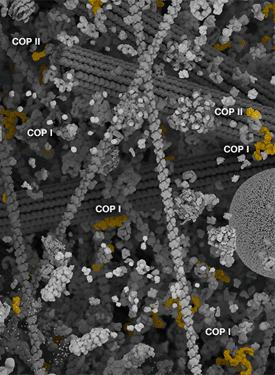Protein Folding
Heat Shock Proteins (HSPs) form seven families (small HSPs (sHSPs), HSP10, 40, 60, 70, 90, and 100) of molecular chaperone proteins that play a central role in the cellular resistance to stress and actin organization. They are involved in the proper folding of proteins and the recognition and refolding of misfolded proteins. HSP expression is induced by a variety of environmental stresses, including heat, hypoxia, nutrient deficiency, free radicals, toxins, ischemia, and UV radiation. HSP27 is a member of the sHSP family. It is phosphorylated at Ser15, Ser78, and Ser82 by MAPKAPK-2 as a result of the activation of the p38 MAP kinase pathway. Phosphorylation and increased concentration of HSP27 has been implicated in actin polymerization and reorganization. HSP70 and HSP90 interact with unfolded proteins to prevent irreversible aggregation and catalyze the refolding of their substrates in an ATP- and co-chaperone-dependent manner. HSP70 has a broad range of substrates including newly synthesized and denatured proteins, while HSP90 tends to have a more limited subset of substrates, most of which are signaling molecules. HSP70 and HSP90 are also essential for the maturation and inactivation of nuclear hormones and other signaling molecules.
References
- Stenmark H (2009) Rab GTPases as coordinators of vesicle traffic. Nat. Rev. Mol. Cell Biol. 10(8), 513–25.
- Horgan CP, McCaffrey MW (2009) The dynamic Rab11-FIPs. Biochem. Soc. Trans. 37(Pt 5), 1032–6.
- Evans CG, Chang L, Gestwicki JE (2010) Heat shock protein 70 (hsp70) as an emerging drug target. J. Med. Chem. 53(12), 4585–602.
- Lanneau D, Wettstein G, Bonniaud P, Garrido C (2010) Heat shock proteins: cell protection through protein triage. ScientificWorldJournal 10, 1543–52.
- Ghayour-Mobarhan M, Saber H, Ferns GA (2012) The potential role of heat shock protein 27 in cardiovascular disease. Clin. Chim. Acta 413(1-2), 15–24.
- Horgan CP, McCaffrey MW (2011) Rab GTPases and microtubule motors. Biochem. Soc. Trans. 39(5), 1202–6.
- Stenmark H (2009) Rab GTPases as coordinators of vesicle traffic. Nat. Rev. Mol. Cell Biol. 10(8), 513–25.
- Horgan CP, McCaffrey MW (2009) The dynamic Rab11-FIPs. Biochem. Soc. Trans. 37(Pt 5), 1032–6.
- Evans CG, Chang L, Gestwicki JE (2010) Heat shock protein 70 (hsp70) as an emerging drug target. J. Med. Chem. 53(12), 4585–602.
- Lanneau D, Wettstein G, Bonniaud P, Garrido C (2010) Heat shock proteins: cell protection through protein triage. ScientificWorldJournal 10, 1543–52.
- Ghayour-Mobarhan M, Saber H, Ferns GA (2012) The potential role of heat shock protein 27 in cardiovascular disease. Clin. Chim. Acta 413(1-2), 15–24.
- Horgan CP, McCaffrey MW (2011) Rab GTPases and microtubule motors. Biochem. Soc. Trans. 39(5), 1202–6.

